It is with heavy heart that STARRS learned of the passing on 29 July 2024 of an institution within the institution of the US Air Force Academy: Brig. General Malham Wakin, former head of the Department of Philosophy whose teachings and work on military ethics and the concept of duty influenced so many generations of cadets.
General Wakin joined the US Air Force in 1953 and was a flight navigator before beginning to teach at the Air Force Academy in 1959. He spent most of his career at the Academy and served as the head of the Department of Philosophy. Gen. Wakin retired from active duty in 1995, but continued teaching at the Academy until finally retiring, after nearly 60 years, in 2016.
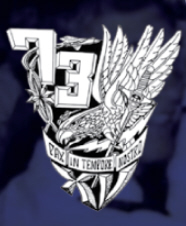 The USAFA Class of 1973, champions for character development, considered him a mentor and friend and inducted the General as an Honorary Member of their class. Only two other persons were named honorary class members at the Academy: General Dwight D. Eisenhower for the Class of 1959 and President John F. Kennedy for the class of 1963.
The USAFA Class of 1973, champions for character development, considered him a mentor and friend and inducted the General as an Honorary Member of their class. Only two other persons were named honorary class members at the Academy: General Dwight D. Eisenhower for the Class of 1959 and President John F. Kennedy for the class of 1963.
General Wakin’s contributions extended beyond the military, as he authored several works on military ethics, including “War, Morality, and the Military Profession”. Notably, Marine General and U.S. Secretary of Defense James Mattis recommended this book as essential reading.
Entering cadets being introduced into the military profession would find not better example than General Wakin’s book, “Integrity First: Reflections of a Military Philosopher”.
Wakin’s dedication to education and ethics left a lasting impact on the Air Force Academy community. He will be greatly missed but his monumental legacy will continue.
At his retirement ceremony in 2016 in the newly opened Polaris Hall, he said, “Thank you for the immeasurable privilege of being able to teach.”
BOOKS:
Integrity First: Reflections of a Military Philosopher
Brigadier General Malham M. Wakin, head of the philosophy department at the U.S. Air Force Academy for over thirty years, is one of the most esteemed military ethicists in the United States. This collection of essays—the first to be published together in a single volume—will be essential reading for anyone interested in the field of applied and theoretical ethics. Covering such diverse issues as war and morality, legal ethics, medical ethics, business ethics, conflict mediation, pacifism, just war theory, religion and war, and nuclear deterrence, Integrity First includes work that not only treats issues of longstanding historical significance, but also has relevance to any serious discussion of modern justice.
War, Morality, And The Military Profession
This anthology brings together material on two major related topics: the military profession, and morality and war. The revised and updated edition retains those sections that made the original version indispensable in the classroom, while incorporating new selections on topics of special concern for the 1980s and beyond. In particular, Colonel Wakin has included essays focusing on the relevance of nuclear deterrence and “just war” theory in the nuclear age. More than a third of the chapters are new. The articles in the first section stress the ethical dimensions of the military profession, considering topics such as the conflict between military values and societal norms, the relation of the military to the state, and the concepts of loyalty, honor, and integrity. New chapters include an essay by Vice Admiral James B. Stockdale suggesting how moral philosophy can serve the profession, contemporary commentaries on the profession by Jacques Barzun and Max Lerner, and new thoughts on ethics and leadership by Colonel Wakin.
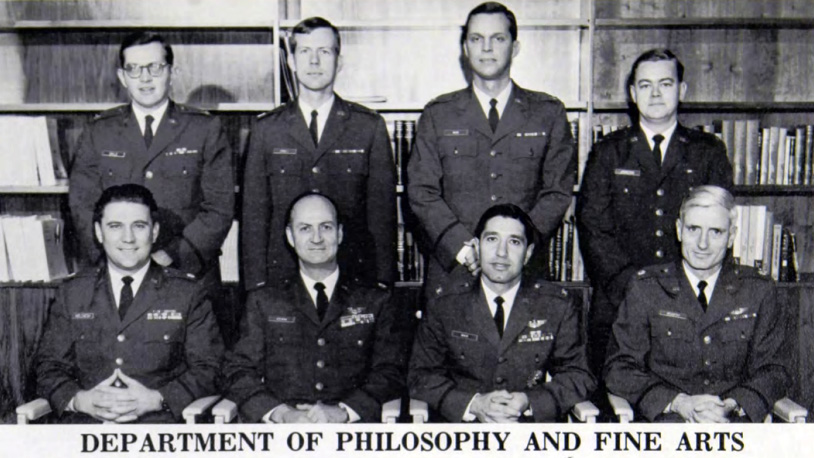 USAFA 1970, front row, second from the right
USAFA 1970, front row, second from the right
1 event, 2 celebrations: Polaris Hall opens, Academy educator Wakin retires (USAFA, 27 April 2016)
When one door closes at the Air Force Academy, another opens. This was the case at the Air Force Academy April 25 when Polaris Hall, the tower housing the Center for Leadership and Character Development, officially opened for business and a longtime Academy educator retired from an his active 57-year teaching career.
Retired Brig. Gen. Malham Wakin, the Academy’s professor emeritus of philosophy, gave an inaugural address celebrating the grand opening of Polaris Hall, the mission of the CCLD, and doubling as his retirement speech.
Wakin discussed the evolution of character-building at the Academy, and the burgeoning acceptance in military circles that lessons in character and integrity can profoundly affect military leaders.
At the top of Wakin’s list for character development was integrity, the most important character trait every Academy cadet and military leader should cultivate, he said.
“What if you, as a leader, do not have integrity?” he said. “No one will trust you. Do you think that without integrity, that [leader] will get loyalty and trust from his troops?”. . . . (read more)
Apr 14, 2016: Brig. Gen. Malham M. Wakin, US Air Force retired, speaks during the 2016 National Character and Leadership Symposium held at the United States Air Force Academy.
Brig. Gen. Malham M. Wakin, USAF, Ph.D., Presented with the Albert Nelson Marquis Lifetime Achievement Award by Marquis Who’s Who (Additional biography)
The Vocation of Arms
By Paul L. Briand Jr. USAF and Malham M. Wakin USAF
Air Force Magazine, July 1, 1963
One of the most searing unresolved issues in the conduct of the cold war is not the advantage of missiles over manned bombers, not which is the ‘best” TFX, not the use of nuclear vs. conventional weapons. It is the more serious question of people, without whom all weapon systems are as ineffective as a challenge to a fistfight by an armless man. It is the problem of how to keep servicemen in the service.
Solutions have, of course, been offered, criticisms have been leveled, alarms have been sounded. Clarence B. Randall, Chairman of the President’s Pay Advisory Group, has endorsed a fourteen percent pay increase for the military, and he favors a retirement system that would replace the present twenty-year plan. Both proposals, the Administration hopes, will keep people in the service of their country longer.
Daniel Bell, in a recent article in The Columbia University Forum, has called the uniformed services “the military dispossessed.” Because, he says, “of its outmoded curriculum, its recruitment and promotion patterns, the vested interests of the different services, and the concentration at the top levels of officers trained in older notions of strategy, [it] is ill-equipped to grasp modern conceptions of politics, or to use tools—computer simulation, linear programing, gaming theory—of strategic planning.”
Morris Janowitz, in his definitive study, The Professional Soldier, indicates that twenty to twenty-five percent of the graduates of the military and naval academies (it’s fifty percent among ROTC graduates) are resigning their commissions after four or five years of service. He predicts an even higher attrition among Air Force Academy graduates, because they possess skills that are more directly transferable to civilian occupations.
Speaking of the ever-narrowing gap between the military and the civilian, in which the military is becoming more civilianized and the civilian militarized, Janowitz clearly sees, nevertheless, the essential role of the armed forces:
“. . . the military establishment has a special environment because it alone has the organizational responsibility for preparing and managing war and combat.”
David Boroff, in his recent series of articles on the three service academies (Harper’s, December 1962, and January and February 1963) is fearful of the very word mission.
The mission, we assert, simply and positively establishes the threefold need of soldier-scholar-athlete for duty-honor-country.
Boroff wants civilian solutions for service problems. In his article about Annapolis, for example, he makes the civilian mistake of lumping prestige and pay together, as if the two were inseparable in the American way of life: “Military service must be dramatically upgraded both in terms of prestige and pay. It should have serious importance of the kind that service in the State Department or in a high government agency currently enjoys.”
The armed services themselves are not without guilt, particularly in their recruiting advertisements, when they too often beckon with material lures, too often stress pay and promotion, retirement at a young age, education and travel, in order to attract and keep young men in service for lifetime careers. The services should not, therefore, be puzzled if these same young men leave military careers for more of the same benefits in civilian life.
The US government itself, however unwittingly, encourages the quick departure of the young and the bright from the services, by offering and paying out of its own pocket sometimes even greater financial rewards—by simply tearing Uncle Sam from its recruiting posters and replacing him with a defense contractor or a civil servant. The same government which trains and educates the young people it wants to keep for lifetime service often lures them into civilian jobs with higher pay—and still continues to pay the bill.
The story is bruited about almost daily in military circles how, for example, a master sergeant has not re-enlisted but has taken a high-paying job with quicker promotion prospects, in an electronic firm—a defense subcontractor; or how a colonel has resigned his commission (just a few years before retirement), to become a vice president of an aircraft corporation—a defense contractor; or how a young Academy or ROTC graduate has left the service to become a civil servant at a five-figure salary.
These people who do resign argue that they are, after all, still working for the government, either directly or indirectly; it is still the same old Uncle Sam who is paying their wages. No one challenges this argument.
The challenge—and there is one—is, bitterly and realistically, in quite another place. It cannot be seen on posters, or found in the offers of promotion and pay and retirement, in or out of the service. The challenge is to, and in, the minds and hearts of all Americans.
The serious soul-searching of many men as they decide whether to stay in or leave the service is often testimony to their understanding of the importance of the problem. But all too frequently the reasons they give for leaving, and indeed for staying in, are almost irrelevant to the central issues. They confuse the real reasons with their given reasons.
There is the easy confusion about “work”; it is a job, just another way of making a living. If it is for them, a job, then we ask: Is it something for which they strive to be paid more and more for doing less and less so that they might have more time in which to do nothing? Is it what they do during their waking hours? What if it is disliked, boring, yields no sense of fulfillment or satisfaction? And suppose this happens every day, in or out of the military.
One of the most vital human needs is fulfillment in work. Aristotle knowingly observed that all men by nature desire to know—we are curious beings; but all men by nature also desire to accomplish—we are purposive beings.
Every man, every military man, needs to feel satisfaction in some accomplished task. The life in which this need is never or seldom realized is robbed of something essentially human.
The serviceman’s legendary gripe, or the anxious, bewildered cry of loss from our “beats” and angry young men (our stay-at-home lost generation), is more like an agonized wail at not having found themselves in any activity. They have not made, or care not to make, the necessary distinction between a job and a profession, or between a profession and a vocation. For each, in ascending order, gives a greater sense of involvement, fulfillment, and satisfaction.
If a job is something to get paid for doing from eight to five, if it is something to leave behind on the way home, then it becomes something distinct and separate from our total lives.
If it is a profession, then it surrenders to a larger part of our lives; there is a greater involvement, a more total commitment.
We see this heartening sense of accomplishment in many doctors, some lawyers, and a few great teachers.
When a man’s work is his vocation, however, then we see a total engagement of his life and personality, a complete outlet for self-expression, a conclusive realization of his potential. Such a vocation clearly marks and distinguishes the best of what a good man has in him.
Moreover, any work may be a vocation for any man, if the degree of his involvement and the quality of his skill and dedication are of the highest order.
John W. Gardner, President of the Carnegie Corporation of New York, has acutely perceived this important distinction:
“The society which scorns excellence in plumbing because plumbing is a humble activity, and tolerates shoddiness in philosophy because philosophy is an exalted activity, will have neither good plumbing nor good philosophy. Neither its pipes nor its theories will hold water.”
The Gardner comment, unfortunately, all too often holds true in America. We are annoyed by the repaired automobile, washing machine, stove, or refrigerator that still does not work because the mechanic was not really a mechanic; the children’s shoes that break down after thirty days because the cobbler was not really a cobbler; the house that cracks along the walls and ceilings because the builder was not really a builder.
Can a nation last when things are not made to last? Not unless everyone from the philosopher to the plumber, from the general to the private, can look upon his work as a vocation. Otherwise, each falls far short of what his own life and talents can offer society.
Society falls short to the degree that each man, successively, fails in living the life of a total human being.
Moreover, a philosopher, or a plumber, or a soldier must be able to live with himself before he can live with others; he must be true to his own talents, interests, and capabilities before he can genuinely contribute to life around him.
That sailor or airman who remains in a job merely because of financial security, while his abilities lie elsewhere in civilian life, is untrue to himself and to his country.
Although there may be family and economic pressures that make it practically impossible for him to pursue his “vocation,” these considerations do not alter the fundamental principle.
While it is flagrantly obvious that human nature is not perfect, it is still true that if men fail to seek its ideal conditions, then there is little hope left for growth and progress.
The military life can be a perfect vocation, although the short-termer may look at it merely as a job and the career officer and airman may regard it primarily as a profession.
No one questions the necessity of military service in wartime, and all question the man who fails to answer his country’s call.
But what of military service in time of peace? The serviceman is then viewed, even by veterans, with distrust. He is taunted as an economic leech, draining off the lifeblood of the nation—$56 billion for fiscal year 1964, about half of the national budget!
Sensational best-selling novels, like Fail-Safe and Seven Days in May, portray him (to his incredulous astonishment) as one blindly willing to destroy almost half of the entire world or even as an exponent of treason.
He is even accused, by Fred J. Cook in the book The Warfare State, of being part of a sinister military-industrial combine hopeful of taking over the country. Incredibly, he bears these libels in bristling but mute indignation. The prestige and respect that the man in uniform enjoyed in wartime is just as clearly lost to him in periods of peace. He is suspect. He is tolerated.
These ironies encase a hard paradox in our civilization: The man who preserves life, like the medical doctor, enjoys the highest prestige (we are “scared to death” to die and we will pay almost any price to live); yet the soldier or sailor or airman, in a hot or cold or lukewarm war, who is prepared to die, if need be, in the defense of his country, who is sworn to preserve the very conditions that make life possible for others, enjoys no such prestige.
The man who voluntarily puts on the blue or green uniform of the service implicitly, if not explicitly, commits himself to the principal view that there are some values in life worth more than life itself.
There is something worth the risk of life. That something is the way life is lived. All servicemen discover themselves the allies of Socrates, who lived and died with the unshakeable conviction that a decent man cherishes far more whether he does right or wrong (his way of life) than whether he lives or dies.
Is it maudlin in our time for a young American to say to himself, as others have before him: “I regret that I have but one life to give to my country” or to say: “Is life so dear or peace so sweet as to be purchased at the price of chains and slavery? Forbid it, Almighty God!”? Is it soft to mean it when you say: “Better dead than red!”?
Thankfully, there are still thousands of Americans in uniform, who despite temptations to life in mufti; who in spite of the criticisms of pedagogues about their training and education, of economists about their high spending, of technologists about push-button missiles that will replace them; who, when the order is given to proceed to Vietnam or Cuba, hold to a simple unspoken belief: Death, if necessary, so that others may live.
Certainly the prestige accorded a doctor is deserved because the doctor’s essential function is aimed at an important value: the preservation of life.
But the essential function of the armed forces of a free nation is aimed at an even higher value: the preservation of the very conditions that make life possible.
We propose that the military profession has the right to the respect given to other professions. And from the point of view of its essential function, it is perhaps an even more “noble” profession than most others.
But more than a job, and more than a profession, military life can be a completely satisfactory vocation. Military service in the United States today ranges over a number of specialized activities. An ensign may be an expert in nuclear physics, or a sailor a deep-sea diver; a captain may be a jet pilot, or a soldier a Paramedic; a lieutenant commander may program computers, or a chief petty officer command a tug; a major may be a neurosurgeon, lawyer, political-science professor, or rabbi—or an airman a cryptanalyst.
And the Astronauts, their wearing of civilian clothes notwithstanding, are Lieutenant Colonel John Glenn, Lieutenant Commander Scott Carpenter, Major Virgil I. Grissom, Commander Alan B. Shepard, Jr., Major L. Gordon Cooper, and Commander Walter Schirra—all officers in the uniformed services of their country.
Thus a serviceman’s specialty may by itself take on the distinction of a vocation. But if, for example, the Air Force pilot has found his vocation in flying, what difference does it make if he should resign and fly for a civilian airline? The difference, to us, is crucially important. Military life adds significance to the vocation of the captain-pilot which the airline pilot need never ponder.
The military vocation, whether of pilot, deep-sea diver, or cryptanalyst, requires a further dedication, an extra sense of responsibility. Unlike the civilian doctor, lawyer, or teacher, who practices his essential function all the time, the military man sometimes seems so far removed from his that it is difficult for him to keep his primary purpose in mind.
Regardless of these hazards, however, this full commitment to a higher cause by a serviceman guarantees the preservation of a way of life which permits any man to seek his own work anywhere. It is a vocation that allows others the right to pursue their own vocations.
Despite the call to higher values in a military career, there are admittedly many personal restrictions which seem to prevent the free expression of a total personality in the service—an indispensable requirement before work can become a vocation. Zealous critics will say that anyone who has ever served “knows” that military men take orders; that the “military mind” is stagnant, conservative, and unoriginal; that many assignments force a man into a job he hates, to work for a superior he dislikes, and in a climate he abhors. And they ask—How can these conditions make a vocation of work?
We say that in the large these are glib critiques that do not square with the facts of present-day military life. We do not deny the existence of rigidity in the military. We suggest rather that where it occurs it is of the same brand that afflicts any large organized segment of our society.
But if there is a “military mind” in the service today, it belongs not to the American counterpart of Colonel Blimp, but to what Morris Janowitz, with keen insight, calls “the intellectual officer” or “the military intellectual.”
Janowitz describes the intellectual officer as the soldier (his inclusive term for all servicemen) “who brings an intellectual dimension to his job. His intellectual quality is held in check by the needs of the profession. He sees himself primarily as a soldier, and his intellectuality is part of his belief that he is a whole man.”
The military intellectual,” on the other hand, “is a markedly different type. Although he is a professional soldier, his attachments and identifications are primarily with intellectuals and intellectual activities. He would have no trouble shifting from military to university life, for his orientations are essentially scholarly. He is generally denied, or unequipped, for the highest command posts, as would be the case with intellectuals in civilian society. His position is essentially advisory, but, in the military setting, the advisory post is institutionalized and accepted,” Janowitz writes.
These uniformed intellectuals with or without Ph.D.s are in the ranks, but there is a great need in the military life not only for these thinkers, but also for thinkers from all disciplines—military, scientific, and humanistic.
The political, scientific, economic, social, and cultural implications of policy-level, military decisions made today must be studied and evaluated by the most knowledgeable minds in the nation, minds that must also belong to men in uniform.
And this creative and analytical thinking must be joined to the most responsible kind of self-discipline in the taking and giving of orders. In the military man the two must work inextricably together, for discipline and creative thinking are not mutually exclusive. Indeed, they are mutually dependent.
If the military wishes to ensure for itself the dignity and prestige which it rightly deserves because of its very purpose for being, then it must assume certain responsibilities. It must squarely face the issue of vocations as any thinking human being must in any type of work. It must be convinced that the values at stake are worth a total commitment.
If it wishes to merit the respect of others, it must first respect itself; and internal respect for the military way of life begins when all servicemen view it not as a job, not as a profession, but as a vocation.
This same attitude must then extend and pervade the thinking of all Americans—of the parents of young men considering the service as a career, of the businessmen alarmed at the military use of tax dollars, of professional men unaware that there are others as dedicated as they, and finally, of the lobby groups who pressure some congressmen into favoring the represented nonuniformed government services over the nonrepresented uniformed services of that same government.
If the American way of life is really more important than life itself, then the military life is, indeed, a noble calling. The vocation of arms deserves the total dedication of thoughtful men and the respect of free men everywhere.
_
Major Briand, Associate Professor of English at the Air Force Academy, is a combat veteran of World War II, a native of Cambridge, Mass., and author of a recent biography of Amelia Earhart, Daughter of the Sky (Duell, Sloan, & Pearce, New York, 1960). He holds a B.A. from the University of New Hampshire, an M.A. in English from Columbia University, and a Ph.D. from the University of Denver.
Captain Wakin, Assistant Professor of Philosophy at the Air Force Academy, is a native of Oneonta, N. Y., and is a rated senior navigator who has served with air-rescue units. He holds a B.A. from Notre Dame, an M.A. from the State University of New York, and a Ph.D. in philosophy from the University of California.

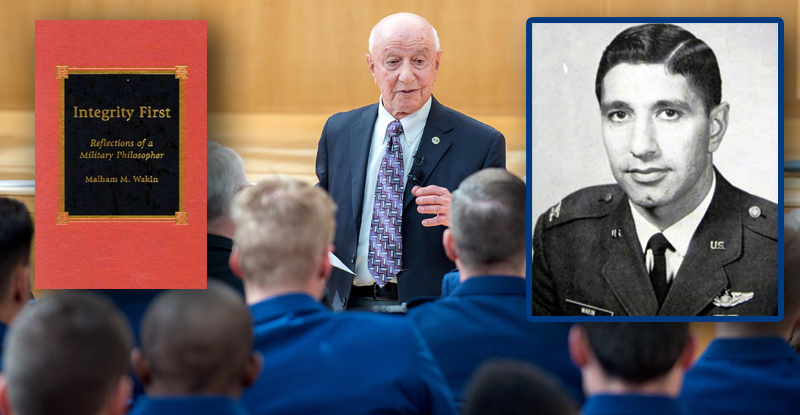


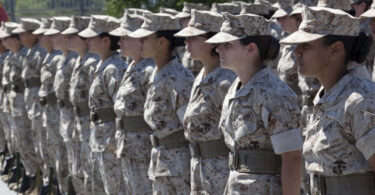

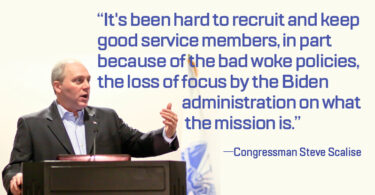

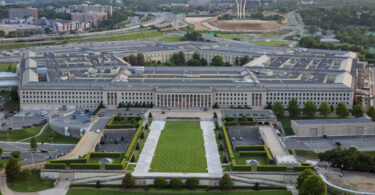
This article is significant to propel further. I must add the notion that to make a vocation from a job is supported with conscription of all citizens to the cause. I propose that all citizens serve their country. Young people learning there are entities bigger than themselves important in their lives. A service to others. If citizens have a choice to serve organizations in addition to or aside from the military. Our government has many agencies, but even service organizations could be categorized for “service time” as defined. Our country is losing support from citizens because many have not served or realized a need to do so. They therefore resolve to the loss of their country in name of their personal goals. Service is satisfaction, training, support, success for a lifetime. I encourage a discussion to engage our citizens for service.
Rest In Peace Dear General M.M. Wakin
Then Capt Wakin was one of my favorite instructors at USAFA. His classes were always enjoyable and, most of all, challenging and engaging. He encouraged us to think deeply and civilly discuss our differences on important issues and concepts. As cadets coming from all parts of the country and from many backgrounds, his classes helped in the process of “e pluribus unum” for a military of many different individuals, civilly united for a great and common cause, the defense of our nation against all enemies, foreign and domestic.
Today’s travesty of DEI infecting the leadership of our military academies is exactly the opposite. We need a thousand generals like Gen Wakin, instead of the PC sycophants in charge today.
Mike Matin
USAF ’66
Great comment Mike, thank you!